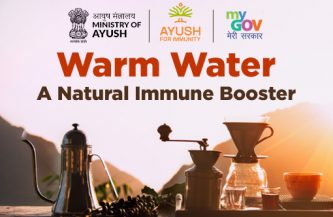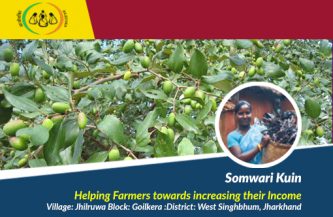The transition from a House-Wife to an Agro-Entrepreneur – Sarala A. Bangare

Sarala, was a poor woman who used to depend on rainfed single cropping farmlands from her in laws. She got training on agro-ecological practices as a Krishi Sakhi during the process. She also dug a well through MGNREGS, installed a drip irrigation system, taking a loan from SHG, introduced chemical-free Rabi season vegetables in her field. She has inspired another 20 women from SHGs. She also has addressed the challenges of vegetable marketing through collectivization at Producer’s Group (PG) level, doing the business of organic products and earning about Rs 90,000 per annum).

Sarala and her husband live in Malkapur village of Wardha district (Maharashtra), cultivated cotton and soybean only in the Kharif season on their land.
The rest of the season, agriculture (i.e. Rabi and Zaid) was uncertain due to lack of irrigation. Farmers in her village searched for other livelihood options during the lean season, which was challenging to get. The flow of income throughout the year was the challenge. Besides, low yield in their main crops, cotton (0.5 tonnes/acre), soybean (0.01 tonne/acre) with the high cost of cultivation had made their situation vulnerable. For example, with an annual expense of Rs 1.23 lakh in agriculture, Sarala earned gross revenue of about Rs 1.26 lakh. This had happened because of excess uses and rising prices of chemical fertilizer and pesticides resulting in deterioration soil fertility and moisture holding capacity of the soil. Life became more complicated day by day for Sarala and her husband and the whole of the village.

Sarala got her first breakthrough, in 2013 after becoming a member of Gayatri Mahila Bachat Samuha (SHG) promoted by Maharashtra State Rural Livelihood Mission (MSRLM) in her village. She has been an active member and participating in all activities of SHG. With the introduction of MKSP in 2016 by MSRLM in Wardha district, Sarala was selected as a Krishi Sakhi of her village. After that, she got a total of 16 days training in multiple events from MSRLM on various practices in agro-ecology. But it was difficult for her to convert the learning into the methods as her husband was not convinced with the new practices on agro-ecology. Subsequently, he got confident after both of them repeatedly attended the Farmers Field School (FFS) promoted by the Cluster Agriculture Manager (CAM). She could realize that irrigation is the challenge before any crop beyond Kharif. Thus, she applied and got a dug-well on their land through MGNREGS. After that, she borrowed Rs 30,000 from her Village Organization (VO) and installed a drip irrigation system on her farm. Irrigation being assured, she then introduced the cultivation of vegetables during the Rabi season (September to March) in addition to Cotton and Soybean they used to cultivate in Kharif season. Crops like tomato, cabbage, brinjal, cucumber were cultivated following the improved agro-ecological practices that include the application of Jeevamrut, Neemastra compost, vermicomposting, etc, she had learnt through her training.

All these led to Sarala’s family to have better and assured income throughout the year. Thoroughly convinced by the new method of agriculture she has followed, she inspired 20 SHG members of her village, who started following Sarala. When production got stabilized, all the 21 SHG members (including herself) faced the challenge of marketing of their produces as the price of vegetable in local market experienced a nosedive due to a sudden increase in production. MSRLM intervened again and organized all these 21 SHG members into a vegetable Producer Group (PG). Now they have collectivized their produces at the PG level, and they transport their vegetables to the distant big Mandis in Wardha. This has made the most significant differences in their income as they started selling vegetables worth Rs 20,000 to Rs 21,000 per day at PG level during the growing season of September to March, which was earlier a lean season for agriculture in her village and people were struggling for meaningful livelihood opportunities.
Encouraged by her success, and seeing the rising popularity of organic manures and pesticides, she purchased two cows out of her additional income and started preparing organic manure and bio-pesticides at commercial scale. Till date, she has already earned Rs 89,650 by selling 1 tonne vermi-compost, 5 kg of earthworm, 10 litres of bio-decomposer, botanical extract 137 litres; 100 litres of Neem extract and 2.1 tonnes of NADEP-compost to her village as well as neighbouring villages. The break up incomes from different products are presented below:

More confident Sarala, since 2016 as Krishi Sakhi has been training 161 SHG members (farmers) of her village Deoli) and demonstrating different practices like Jeevamrut, Neemastra, compost making, vermicomposting, etc. Her confidence, skill, intelligence, and excellent communication skills had helped her in transferring and adoption of new practices by the farmers she is engaged. She could increase the number of organic farmers in the village from zero to 161. Farmers from neighbouring villages approach her for organic manures, compost, and organic pesticides that she produces.
Now, Sarala has increased her monthly income by Rs 6,000 to Rs. 7,000. She has become a well-known farmer, recognized by her district as the best Krishi Sakhi in 2018-19 and is selected as the best Krishi-Mitra by Agriculture Department of Wardha district.




